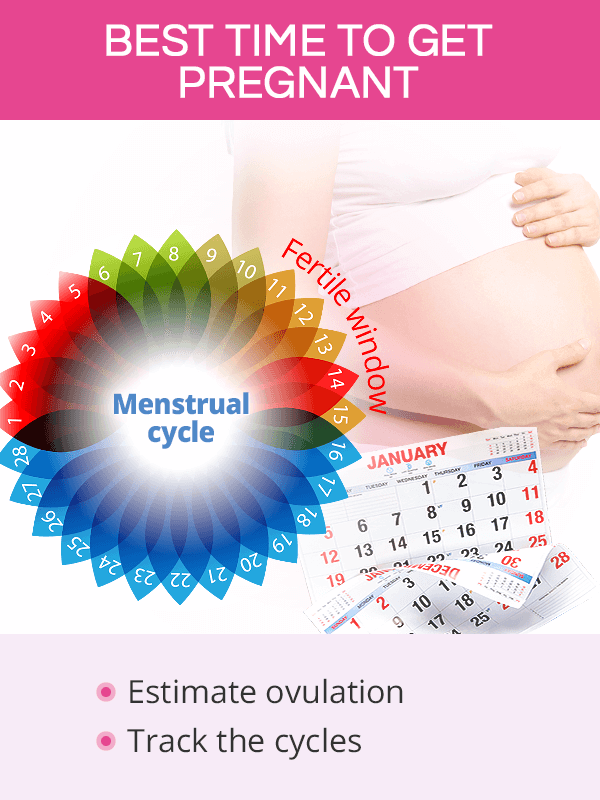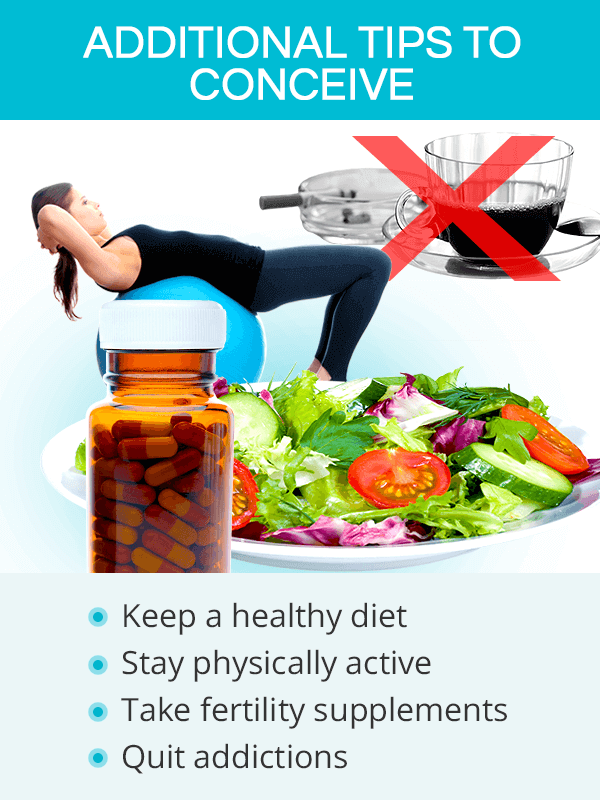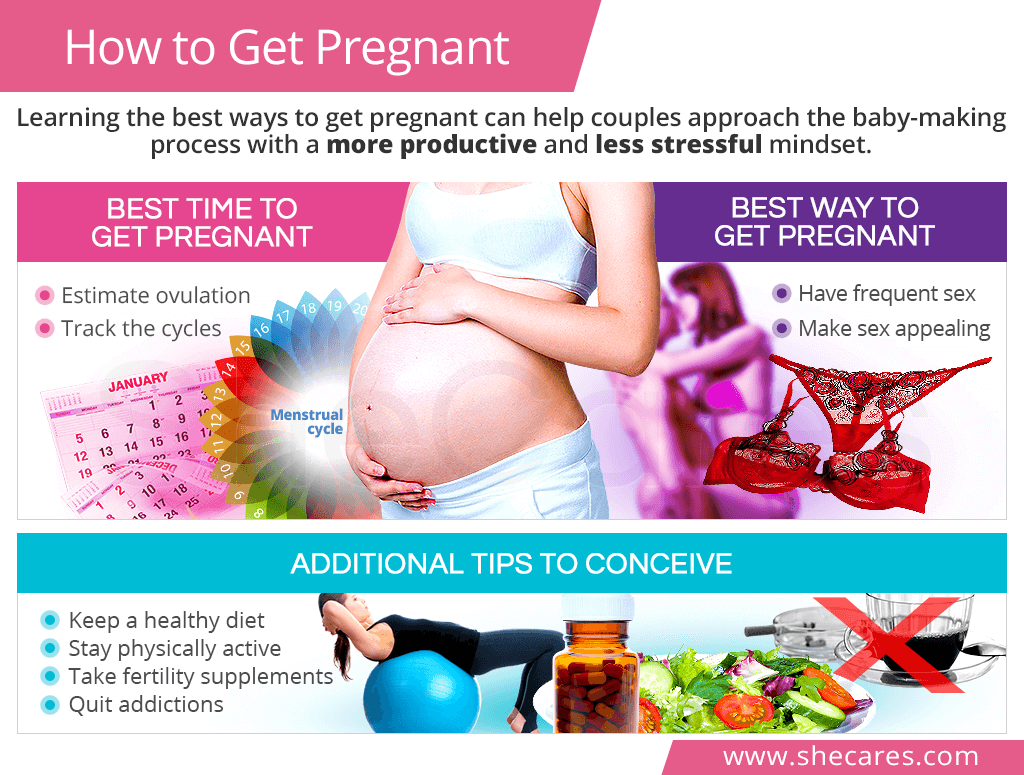Best Time to Get Pregnant

When it comes to getting pregnant, timing is everything. But for pinpointing when is the easiest time to get pregnant, it is necessary to understand one's menstrual cycle.
A woman is only able to get pregnant for a short period of time every month, which is referred to as fertile window and covers three to five days before and the day of ovulation. When ovulation is finished 24 hours later, hormonal changes will make a make it impossible for a woman to conceive until she enters her fertile window the following month.
Learn to Estimate Ovulation
Learning to predict ovulation is by far the most important skill an aspiring mother can learn, especially those getting pregnant with irregular periods. It can be achieved with the help of various ovulation tests, including:
Self-assessment ovulation tests use the body's own cues that hormonal fluctuations are taking place leading to ovulation. They consist of measuring basal body temperature, cervical mucus observation, or checking cervical position.
At-home ovulation tests include store-bought products that detect hormone levels indicating a woman is entering her fertile days. These consist of ovulation test kits or ferning microscopes.
Keep Track of the Cycles
Once a woman detects her fertile days, it is beneficial to keep track of them so that she can clearly visualize month-to-month what the best time to conceive a baby is. Various ovulation predictors are handy tools that can help with tracking menstrual patterns, ranging from ovulation calendars and calculators to trackers and monitors.
Best Way to Get Pregnant

As aforementioned, knowing when to get pregnant is more important than knowing how to do so. Nevertheless, there are a variety of helpful tips to become pregnant fast and easy.
Have Frequent Sex
Although timing intercourse to a woman's fertile window is the best way to conceive fast, some couples might find it stressful and challenging with everyday busyness. In fact, studies have shown that limiting intercourse to only ovulation might not be the most productive approach as it is easy to miss it.
Instead, a helpful tip to get pregnant with less stress and logistics involved is to have sex frequently and regularly throughout the month. Couples who are intimate every two to three days will have intercourse during a fertile window even without prior estimations.
Spice Up the Routine
Couples attempting to get pregnant are typically informed that it is normal to take a full year to get pregnant, unless a woman is 35 or older, in which case the cut-off time before getting help conceiving is six months.
As such, to maintain good baby-making libido while having frequent sex, couples can make it a playful game to search for new ways to spice things up in the bedroom. It may range from offering each other sensual massages and trying out various sex positions to get pregnant to taking a weekend away from home or experimenting with sex toys.
Additional Tips to Conceive

Although many couples successfully get pregnant without prior preparations, studies have shown that dedicating time to pre-pregnancy planning can significantly increase chances of getting pregnant, while lowering the risk of pregnancy complications.
Some of the best tips to get pregnant might include the following recommendations:
Keep a Healthy Diet
The key to a good fertility diet for proper nutrition and hormonal balance is consuming foods rich in three macronutrients (complex carbohydrates, healthy fats, and lean protein) and pre-pregnancy vitamins and minerals, or micronutrients. Some good example of nutritious foods to eat to get pregnant fast include whole grains (quinoa, buckwheat), plant proteins (beans, lentils), and full-fat dairy.
Stay Physically Active
Exercising is another helpful tip to get pregnant as it regulates hormones needed for ovulation, helps achieve optimal body mass index (BMI), and relieves stress. The best fertility exercise combines a low to moderate level of physical activity 30 minutes day, 3-5 times a week. Cardio workouts with muscle strengthening should be favored over strenuous trainings to avoid menstruation disruption.
Boost Fertility with Supplements
Various supplements to get pregnant fast might also show beneficial in boosting fertility. They particularly include those that work to promote hormonal balance, such as phytoestrogenic herbal supplements of black cohosh or chasteberry as well as hormone-regulating supplements, like Macafem, the latter of which work by stimulating the body to produce its own hormones for optimal fertility.
Quit Addictions
Although it goes without saying that addiction control is key to fertility and a healthy pregnancy, some aspiring mothers still struggle with addictions to tobacco, alcohol, or illicit drugs. Taking the time to quit addictions before conceiving is the best way to prevent future complications. Help is widely available, whether through one's family doctor, local government campaigns, online forums, or free helplines.
Conclusions
Studies have shown that about 80% of healthy couples of reproductive age successfully conceive naturally within the first six month of trying, while about 96% of them do so by continuing trying for a year. This means that for a small percentage of aspiring parents, the question of how to get pregnant is not as straightforward as it might seem. Luckily, there are numerous ways to find help getting pregnant, including managing health conditions before pregnancy, achieving hormonal balance with herbal supplements like Macafem, or stimulating ovulation with medications. When promptly addressed, infertility can be effectively treated to restore many couples' chances of conception and make their dream of parenthood a reality.
Sources
- American Pregnancy Association. (n.d.). How to get Pregnant Naturally. Retrieved March 4, 2019 from https://americanpregnancy.org/naturally/get-pregnant-naturally/
- American Pregnancy Association. (2010). The Essential Guide to Getting Pregnant. Retrieved March 4, 2019 from http://americanpregnancy.org/getting-pregnant-ebook/p7M7O0q1c71703C/gettingpregnant.pdf
- Cleveland Clinic. (2019). Pregnancy: Ovulation, Conception & Getting Pregnant. Retrieved March 4, 2019 from https://my.clevelandclinic.org/health/articles/11585-pregnancy-ovulation-conception--getting-pregnant
- Healthy Women. (n.d.). 4 Tips to Help You Get Pregnant. Retrieved March 4, 2019 from https://www.healthywomen.org/content/article/4-sex-tips-help-you-get-pregnant
- Mayo Clinic. (2016). How to get pregnant. Retrieved March 4, 2019 from https://www.mayoclinic.org/healthy-lifestyle/getting-pregnant/in-depth/how-to-get-pregnant/art-20047611


